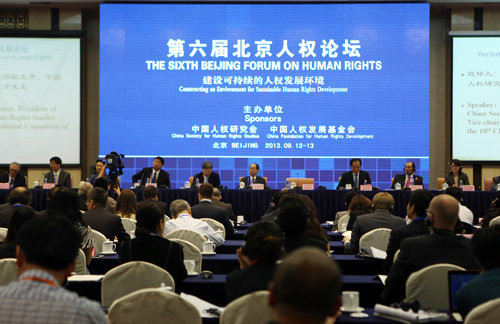|
 |
|
OPENING FLOOR FOR DISCUSSION: The Sixth Beijing Forum on Human Rights opens on September 12 (SHI GANG) |
The Sixth Beijing Forum on Human Rights was held on September 12 and 13 with the theme being "construction of an environment for sustainable human rights development." The forum attracted more than 100 officials and human rights experts from the United Nations and 33 countries and regions.
The forum was jointly organized by the China Society for Human Rights Studies (CSHRS), the largest human rights academic group in China, and the China Foundation for Human Rights Development, a major civil group. The annual event was first held in 2008 and has grown to be a key platform for human rights exchange internationally.
This year's forum has three sub-themes: ties between human rights and the rule of law, social development, and regional security.
"It is extremely important to have meetings like this where people from different cultures meet and have discussions about these issues," said Tom Zwart, a law professor at Utrecht University and Director of the Netherlands School of Human Rights Research, who was attending the event for the third time.
The China case
Dominating the forum's discussions was China's efforts to advance human rights by improving the rule of law and social welfare, as well as the necessity for cooperation between different approaches to human rights issues adopted by developing and developed countries.
In his speech at the forum's opening ceremony, Cai Mingzhao, Minister of the Information Office of the State Council, said that the Chinese Government has laid great emphasis on improving people's living conditions and that the proportion of population in poverty decreased from 84 percent in 1980 to 13 percent in 2012.
He revealed that, by the end of last year, 790 million people in China had participated in at least one basic endowment insurance scheme and that basic medical insurance achieved universal coverage.
Kate Westgarth, former Director of the Chinese Affairs Department of the Foreign and Commonwealth Office of Britain, said that China's greatest achievement in advancing human rights has been the number of people that it has lifted out of poverty. She added that such a progress is often underestimated in the West due to the fact that China does not conform to Western norms.
"I don't think that China's results [in improving its human rights] can be replicated in other countries, but it is a very interesting example of how the Western world's attitudes are not the only ones and it stands as an example for developing countries to pursue things in a different way," Westgarth said.
China has formulated two sessions of national human rights action plans. The first one was implemented on schedule between 2009 and 2010, with all goals in the plan achieved. Now, the second plan for 2012-15 is being put into practice.
An annual report on China's human rights conditions by the CSHRS released in August showed that more and more Chinese people became aware of human rights protection and the social atmosphere is increasingly favorable.
According to a survey on 15,000 people aged between 14 and 70, responding to the question of the three most important rights, 81.1 percent of participants listed personal freedom and dignity, 65.2 percent chose rights to health care and 58.2 percent chose social security.
Rule of law
Luo Haocai, President of the CSHRS, said at the forum that the protection of human rights without the rule of law is impossible.
China has been vigorously upgrading its legal framework in response to social development. In 2013 alone, amended laws directly involving the protection of human rights, including the Criminal Procedure Law, the Civil Procedure Law, the Law on the Protection of the Rights and Interests of the Elderly and the Labor Contract Law, have come into effect.
| 